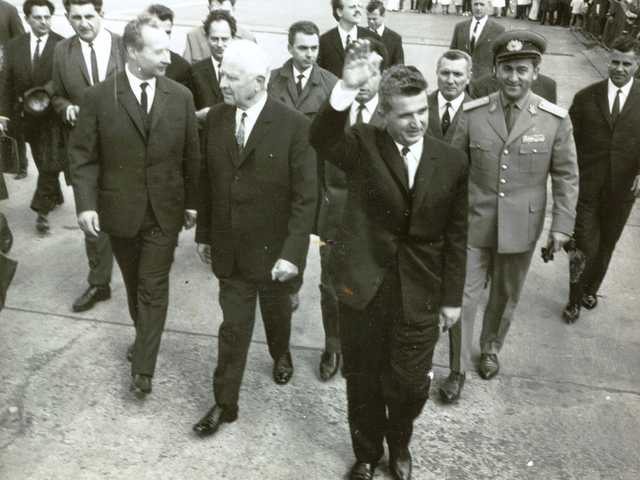Strategies used by Nicolae Ceausescu to legitimise his power
Nicolae Ceausescu became the leader of the Romanian Communist Party, at the 9th Party Congress, held in 1965. At the time, he was seen as a representative of the younger generation and a man eager to embrace change and able to fix the mistakes of the past

Steliu Lambru, 14.04.2014, 12:28
He posed as a reformist and his position during the Prague Spring was widely appreciated. By imposing his own distinct leadership style, Nicolae Ceausescu tried to pursue a transparent decision-making policy, appearing to be very receptive to the wishes and opinions of ordinary citizens. In this respect, he tried to be different from his predecessor, Gheorghe Gheorghiu Dej, the Romanian version of Stalin.
It was eventually clear that Nicolae Ceauscu’s approach to politics, despite its initial dose of authenticity, was a strategy to legitimise his own brand of despotism. It is this apparent authenticity that earned him the support of ordinary people. The historian Mioara Anton from the Nicolae Iorga Institute of History in Bucharest believes Ceausescu’s strategy in the early days of his career was to build an image by which to dissociate himself explicitly from a compromising past. She studied the relationship of Ceausescu’s regime with the citizens as it transpires from three types of documents: letters and invitations, requests for restoring the rights by victims of the former regime and applications to join the Communist Party:
“The first category was a direct consequence of the decree against pregnancy terminations of October 1966, and of that of January 1967 granting the amount of 1,000 lei a month to mothers about to give birth to their third child. The amount was also granted for every following child, often supplemented for larger families. The plan of 4 children per family, but especially this government grant, produced a prodigious amount of letters. The letters display the immense joy of having another child, but also the precarious economic situation of most of the petitioners. These documents hide the drama facing Romanian families. The heavily publicized involvement of the Secretary General creates a new kind of solidarity and a new image for him: brother, loving father, protective parent. Nicolae Ceausescu was invited to take part in the events that were important for citizens, such as weddings and baptisms. People who wanted to make him more sensitive to their situation were baptizing their children Nicolae, or held baptisms around his birthday, January 26.”
Rehabilitating the people who had suffered during the Dej regime was another strong point in the policy of granting Ceausescu legitimacy.
Mioara Anton: “The party plenary meeting of 1968 caused an avalanche of applications and petitions for setting things right in the case of abuses perpetrated against former party members. The revision commissions analysed both political and criminal offences. In light of the plenary meeting of April, a new generation of activists and party members built spotless biographies. The history of the party gains a new context starting from these letters after 1956. Petitioners start requesting recognition of the party credentials, pensions, re-inclusion in party and state structures, recognition of their work record, as well as specific benefits, such as pensions, homes, promotion in army ranks, or the ranks of the political police. Greek Orthodox bishop Alexandru Todea, however, pushed the limits when he sent a letter to Ceausescu on April 27, 1968, writing bitterly, with pain and disgust that the process of rehabilitation had changed nothing in the attitude of the authorities towards him. What Todea did not know is that the plenary did not intend to reconsider the long chain of political trials organized in Romania after 1947.”
The Romanians’ traditional anti-Russian attitude was cultivated to the extreme by Ceausescu, as of 1968, and was a cornerstone of his political behaviour, up to his downfall in 1989.
Mioara Anton: “The emotions that ran high in 1968 caused a very strong anti-Soviet reaction among the regular people, who took the intervention in Czechoslovakia as a potential aggression against Romania. Mihai Rusu, a technical control operator, suggested a state bond system to finance the purchase of tanks and aircraft to defend the country. An anonymous person expressed amazement at the invasion of Czechoslovakia, and assured the Secretary General that all the workers of the Socialist Republic of Romania are united around the party like a rock wall, against any enemy that might threaten the sovereignty of the fatherland. Letters from regular people, anonymous or signed, from every social category, placed Ceausescu in the ranks of historic heroes of the nation who resisted foreign threats.”
In 1974, Nicolae Ceausescu’s personal regime became totally opposed to what it appeared to be between 1965 and 1971. He became more and more despotic, resembling more and more the Stalinist regime which it had taken such pains to distance itself from.





























